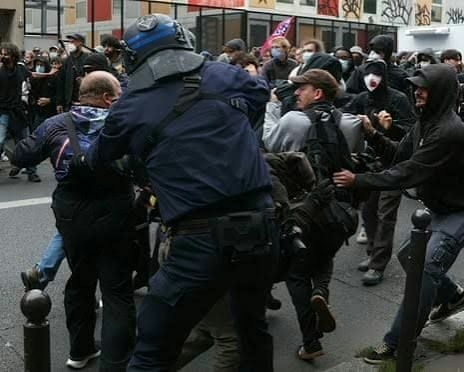On Wednesday, France experienced widespread protests as a grassroots movement called “Block Everything” (Bloquons tout) rallied citizens against President Emmanuel Macron, his administration’s austerity agenda, and the broader political elite.
Protesters caused significant disturbances by obstructing traffic, setting trash bins ablaze, and engaging in confrontations with law enforcement across multiple urban centers. In Rennes, a bus was deliberately set on fire, while a power cable was damaged in the southwest region. Authorities reported nearly 300 arrests nationwide, with Interior Minister Bruno Retailleau confirming the deployment of 80,000 security forces to manage the turmoil.
Despite the extensive mobilization, government officials maintained that the nation’s daily functions were not brought to a halt. Security representatives emphasized that blockades were swiftly cleared, acknowledging some clashes but asserting that France remained operational.
Within the initial hours of the demonstrations, the interior minister announced close to 200 arrests as the protests unfolded.
This wave of unrest coincided with a significant political shift: President Macron appointed Sébastien Lecornu as the new prime minister on Tuesday, marking the fifth leadership change in under two years. Lecornu succeeds François Bayrou, who stepped down after failing to pass a controversial budget aimed at deficit reduction. Analysts predict Lecornu will face a challenging start, navigating a divided parliament alongside widespread public discontent over austerity policies.
The catalyst for the protests is Bayrou’s proposed 2026 budget, which includes cuts amounting to 43.8 million francs, pension freezes, the elimination of two national holidays, and a 5 billion franc reduction in healthcare spending.
Designed to curb France’s fiscal deficit, the budget has sparked intense backlash from left-wing factions. Polls indicate that 69% of the demonstrators supported former leftist leader Jean-Luc Mélenchon in the 2022 presidential race.
However, major labor unions have largely refrained from endorsing the protests. Most have planned their own strikes for September 18, with only the far-left CGT union openly supporting the Block Everything movement.
Distinct from conventional union-led strikes, Block Everything operates as a decentralized, citizen-driven campaign coordinated via social media platforms such as X, TikTok, Telegram, and Facebook. Participants promoted acts of civil disobedience using hashtags like #10septembre2025 and #10septembre, urging boycotts of large retailers including Carrefour, Amazon, and Auchan, mass bank withdrawals, peaceful occupations of symbolic locations such as town halls and legislative assemblies, and the establishment of strike funds.
Although the movement did not fully achieve its goal to “block everything,” initial actions caused significant disruptions. Vinci, the company managing France’s highways, reported blockades in cities like Marseille, Montpellier, Nantes, and Lyon. In Toulouse, a cable fire interrupted rail services, while Paris police detained 75 individuals during early protests.

















